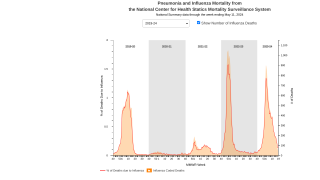Pediatricians To Recommend Inactivated Flu Vaccines for 2018/19

Families will be advised by doctors to choose the inactivated influenza vaccine (IIV) when they vaccinate their children this fall, says the American Academy of Pediatrics (AAP).
This advice is important because 168 influenza-associated pediatric deaths were reported for the 2017-2018 season, as of May 22, 2018.
This is the highest number of pediatric deaths reported in 4 years.
The AAP will publish its formal policy statement on flu prevention and treatment in September 2018.
The decision was made by the AAP Board of Directors after reviewing data on the effectiveness of the flu shot compared with the nasal spray flu vaccine.
The quadrivalent live attenuated influenza vaccine (LAIV4), which is given by intranasal spray to healthy patients ages 2 through 49 years, was a popular option for those reluctant to get a shot.
However, in 2016, the Advisory Committee on Immunization Practices (ACIP) of the Centers for Disease Control and Prevention (CDC) and the AAP reviewed data showing that it was not effective against H1N1 strains of the flu virus and that it was less effective than expected against the H3N2 virus.
They did not recommend it for the 2016-'17 and 2017-'18 seasons.
In February 2018, ACIP decided to make LAIV4 available for the 2018-2019 flu season, based on indirect study data from the manufacturer suggesting their new formulation would be effective, as well as a review of other published research.
However, upon review of the same data, the AAP recommends children receive the injectable form of the vaccine, which was shown to be more consistently effective against most strains of the flu virus over the past several flu seasons.
The 2018 flu season was dominated by the Influenza A (H3N2) virus, said the CDC.
The CDC reports the overall estimated influenza vaccine effectiveness of the 2017–18 seasonal for preventing medically attended, laboratory-confirmed influenza A virus infection was 36 percent.
"We really want to immunize as many children as we can against the flu with what we think will be the most effective vaccine. That's why we're recommending the flu shot," said Henry H. Bernstein, DO, MHCM, FAAP.
“Although shot anxiety in children can be quite stressful for adults, most parents are willing to deal with it in order to provide the best protection from infectious diseases such as flu for their children,” said Natasha Gildersleeve Pharm.D. MTM Clinical Pharmacist and Immunization Specialist, Brookshire Grocery Company.
“Call your local pharmacy and find out when their least busy time of the day is to bring your child in for the flu shot to help decrease the anxiety”.
“Pharmacists will do everything to make your child’s vaccine experience as stress-free as possible whether it means singing a song with your child, giving them a fun band-aid, or letting them pick their favorite flavor of lollipop,” explained Gildersleeve.
"Influenza is unpredictable from season to season, which means vaccine effectiveness can vary by age, health status, and type of vaccine. Recent history has shown the injected form of the vaccine to be more consistent in protecting against most strains of flu virus."
For those children who would otherwise receive no flu vaccine, the AAP says the nasal spray vaccine can be given as a last resort, though it could leave them at higher risk for flu than if they had received the flu shot.
The nasal spray vaccine is not recommended for children under 2 years or children with chronic medical conditions like asthma.
The AAP recommends families talk with their pediatrician if they have any questions about their child's immunizations.
Dr. Bernstein said, "Immunization is the best way to protect children from influenza."
This decision was announced now because physicians are placing orders for the flu vaccine.
Vaccination appointments at local pharmacies can be requested here.
The CDC Vaccine Price List provides the private sector prices for general information.
Flu vaccine discounts can be found here.
Vaccines, like any medicine, can have side effects, says the CDC. You are encouraged to report negative side effects of vaccines to the FDA or CDC.
The American Academy of Pediatrics is an organization of 66,000 primary care pediatricians, pediatric medical subspecialists and pediatric surgical specialists dedicated to the health, safety, and well-being of infants, children, adolescents and young adults.
For more information, visit www.aap.org
Our Trust Standards: Medical Advisory Committee

























